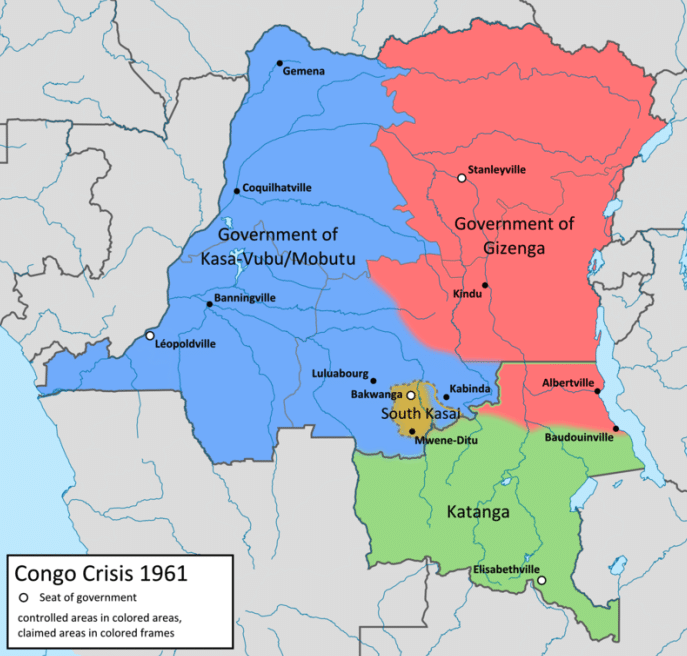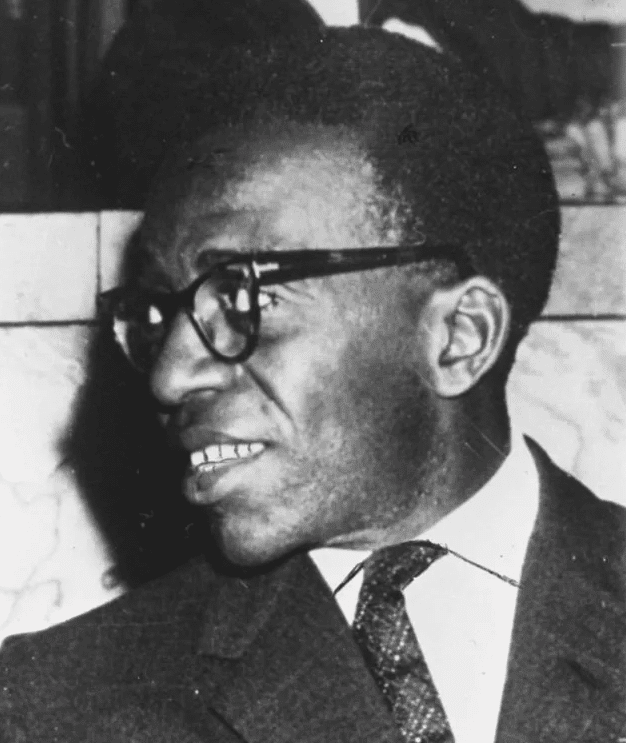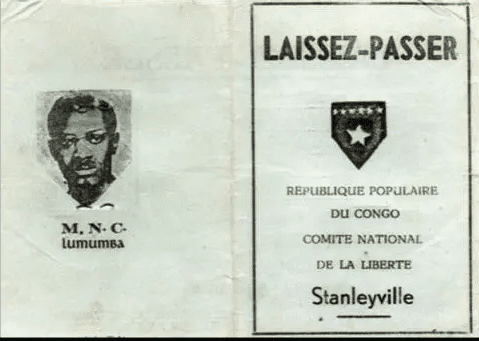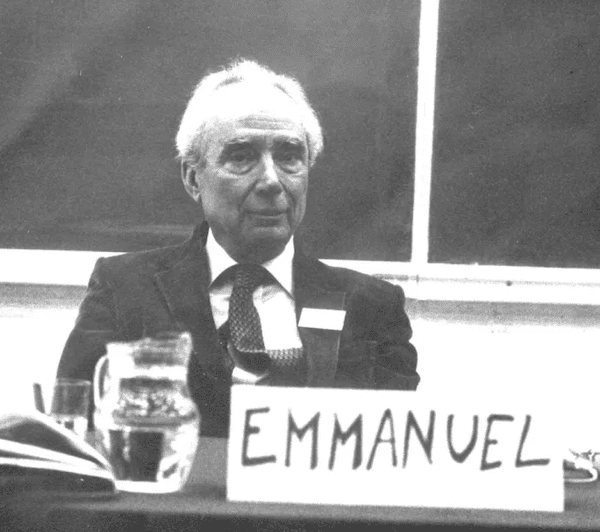There is an ongoing effort to archive the materials of Arghiri Emmanuel (1911-2001), a Greek-French theorist and author of the seminal 1972 critique of imperialism Unequal Exchange. In the process of creating this archive, the Arghiri Emmanuel Association discovered new information about Emmanuel’s time in the Belgian Congo (1937-1941 and 1946-1960). Here, in the second of this two-part instalment (the first post can be found here), Héritier Ilonga details Emmanuel’s relationship with leader of the rebel socialist Free Republic of Congo, Antoine Gizenga, considers the complex nature of his relationship with Lumumba, and reveals Emmanuel’s insistence that socialism—not capitalism—must come first in the Congo.
Lumumba had seen hope in the African diaspora to invest what capital and skills it had in building the Congo. Arghiri Emmanuel made similar recommendations to Antoine Gizenga, Lumumba’s former deputy prime minister who led the rebel socialist Free Republic of Congo from December 12th 1960 to January 1962. At the end of a 1961 document written by Emmanuel (with no clear recipient), in a section entitled “What to do?”, he begins with a summary of the problem at that time. Gizenga had fled Leopoldville with Lumumba, and when the latter was captured by Mobutu’s forces, Gizenga had regrouped around Stanleyville with other Lumumba loyalists. In the article, Emmanuel urges the Stanleyville-based government to make a variety of direct policies, such as “creating in all the branches of the administration the replica of the higher authorities which are centralized in Léopoldville”, while also cutting the Kasa-Vubu/Mobutu-controlled Léopoldville off from “all the Provincial Services, the Banks, the parastatals etc., up to and including the private firms.”

A political map representing the different areas of control during the Congo Crisis of 1961 (Photo: Wikimedia Commons)
Emmanuel recommended that Gizenga utilize the newly-founded central bank in Stanleyville to “open an account in Switzerland, the only place where the Leo[poldville] authorities cannot block it”. Imperative to Emmanuel was the need to “accelerate the Congo’s expansion”, and because he had theorized the limited abilities for nations disadvantaged by low wages to acquire capital, he asserted that “it is obvious that self-financing (reinvestment of profits) is not enough”, and that “external funding is needed. It can consist of private capital or in the form of aid from friendly states”. Many of those friendly states were the ones who recognized Gizenga’s government in the Eastern Bloc and Third World, with Emmanuel commenting that “it is necessary to establish an airline directly from Stanleyville to Cairo.”
The most interesting sections from Emmanuel’s 1961 article are his recommendations for the Free Republic to build socialism in the Congo, strategies that remain relevant today. The basis of this strategy was that Gizenga be “imaginative in seeking formulas for coexistence with the existing trusts in a highly planned economy moving towards socialism.” Emmanuel did not believe in the immediate need to “delink” from the multinationals, especially considering that they were “already half nationalized, the State holding a large portfolio and in many cases the majority”. This allowed Gizenga’s government to,
by force of circumstance, establish a regime of command economy and planning.
But most essential for Emmanuel was “the fact that these trusts being precisely ‘foreigners’ remain parallel and superimposed and do not have much influence on the evolution of Congolese society”. This lack of direct imposition was vital, for “no popular momentum can be created if it does not start from the traditional collectivist structures”. In the communes, Emmanuel saw “collectivist structures [which] constitute an obstacle to the capitalist development sought by colonialism…which would tackle the task of building a classless society.” Emmanuel arrived at an immense conclusion: “It is foolish to believe that one must necessarily pass through capitalism before arriving at a superior regime”. From here, he recommended that “not only must the disintegration of the customary village, initiated by the colonial regime, be stopped, but conservation measures must be taken, [for] the collectivism of the clan must constitute the nucleus of a higher collectivism: popular communes adapted to local conditions.”
The introduction of capitalist social relations prevented an immediate return of land to “its ancestral methods of cultivation, the product of an experience and a balance several thousand years old, i.e. rotating clearing and long fallow periods, which ensured the vitality of crops before the arrival of the Whites”. The imposition of low-waged work also led Emmanuel to present in this section his first formulation of his thesis in Unequal Exchange, before later synthesizing it under Charles Bettelheim at the École Pratique des Hautes Études in 1962, writing that “when an industrialized country exchanges its products with an underdeveloped country, it actually exchanges one hour of national labor for 5, 10 or 15 hours of labor in the other. This exchange rate in turn prohibits the underdeveloped country from carrying out its own capitalization and emerging from underdevelopment”. Ending unequal exchange as the first course of action would be essential to initiate the “transition from a dependent economy to a national economy” whereby it would be possible for the Congo to “adapt it to its new condition as a sovereign country”.
How to achieve the socialization of work alongside the multinationals, while preventing further proletarianization? Emmanuel’s idea for a “dictatorship of the proletariat” seems to parallel his 1979 idea that “martial virtues remain an essential attribute for the proletarian cause”. He describes a workforce “installed as close as possible to the village… floating and interchangeable… a sort of ‘commando’ who will leave their families in the Village and who will return there after some time to be replaced by others. There will be no commitment or individual salary. The company will enter into a contract with the clan, expressed in anonymous man-days and the counterpart will be paid in kind or in cash to the clan’s common fund.”
This unique form of proletarian labor skipped the most problematic aspects of the wage-form and directly supported a shift to a collectivized, planned economy. Emmanuel thus concluded that “when the villages, organized as described above, begin to prosper”, they could form the basis for “the People’s Government [to] take steps to replace certain chiefs, mercantile and corrupt, who used the collectivist and paternalistic structures of the village for their own profit and that of the colonialist”. Emmanuel’s program stressed the necessity to diversify the economy, always having in mind that “above the notion of immediate profitability, narrowly conceived in the capitalist spirit, there is the need to amplify the internal circuit of exchanges and to balance the economy.”
Emmanuel’s kidnapping and exile
In the context of the Congo Crisis, Emmanuel believed, like Lumumba, in the need to preserve the unity of the Congo. He even advised against issuing currency, so as to not appear secessionist. The Free Republic led by Gizenga was nevertheless labeled a secessionist element by the Western-backed government of Joseph Kasa-Vubu, Mobutu, and Moise Tshombe (the leader of the Katanga secession who became the prime minister of the neo-colonial Congolese state from 1964-5) and attacked directly. As Malcolm X explained in January 1965 at the Militant Labor Forum in New York City,
in the Congo, the People’s Republic of the Congo, headquartered at Stanleyville, fought a war for freedom against Tshombe, who is an agent for Western imperialism—and by Western imperialism I mean that which is headquartered in the United States, in the State Department… The struggle is still going on, and America’s man, Tshombe, is still losing.

Antoine Gizenga, Patrice Lumumba’s deputy prime minister and leader of the Free Republic of Congo (Photo: Wikimedia Commons, 1961)
This People’s Republic was attacked as a threat in the Cold War. In 1961, as revealed in a Manchester Guardian article from November 16th, 1971, the Soviet Union had sought to transfer weapons and funds to pay Gizenga’s army in Stanleyville. According to the article, a Czech ship arrived at Port Sudan with boxes of guns disguised as Red Cross supplies. Utilizing a paid crane operator, the CIA had caused the boxes to drop, “and the dockside was suddenly covered with new Soviet Kalashnikov rifles”, much to the chagrin of Sudanese authorities.
In a related incident, after the Soviets agreed to give Gizenga $1 million, channeled through Cairo, a courier was deployed to transfer one-third of the funds through the airport in Khartoum. Hoping to avoid a customs check, he waited in the transit lounge for a plane to the border of the Free Republic. Notified in advance, CIA agents called his name over the loudspeaker and, likely panicking, the courier left the suitcase by some lockers and went to report to Customs. An agent then “sauntered out of the men’s room, picked up the suitcase, and headed out the back door where two cars were waiting with motors running”. This direct interference by the imperialists was hard for Gizenga to match, and his government collapsed before Emmanuel’s program could be realized. The assumption that by “the influence of the good management of our provinces, we [may] arrive at the unification of the Congo more quickly and more easily than by frontal attacks and political tricks” seems not to have squared with the extent to which the enemy was willing to go to crush Gizenga.
Nevertheless, in concluding his 1961 article, as he moved from his experiences in the Congo to his theoretical work under Bettelheim, Emmanuel reflects on his own position by the time of the article’s writing, in July of that year. Lumumba had already been murdered six months earlier in January, and Gizenga’s government would collapse in February of the next year. Emmanuel himself had been kidnapped and deported from Stanleyville to Nairobi by Belgian settler activists earlier in July of 1960, and so was likely writing his advice to Gizenga from exile.
A letter in the possession of Emmanuel’s daughter, Catherine, written to him by Patrice Lumumba after his kidnapping in July, invited Emmanuel to return to the Congo by whatever means he could, but he was likely unable to as the Belgian state also declared him “dangerous to public order” on November 4th 1960. It seems Emmanuel appealed to Lumumba’s personal lawyer Jacques Marres to help him overturn the proscription, to no avail. Nevertheless, in a letter to Immanuel Wallerstein from June 1972, Emmanuel mentions he had recently returned from a trip to Kinshasa, demonstrating his continued interest in Congolese politics.
Emmanuel continued to follow the left-wing resistance in the Congo after his deportation. In his 1979 article, he concludes with reference to Pierre Mulele’s movement as an attempt at “cultural revolution” in a decolonizing context. As he writes:
… in Zaïre, this situation attained a high degree of purity, culminating in 1964 in a popular uprising and large-scale civil war, the revolt of the ‘Mulelists’. At its peak, the latter controlled three-quarters of the country and seriously threatened the capital. This movement, completely ignored by Marxist analysts—no doubt because it did not fit conventional class-struggle schemes—was directed exclusively against the corps of civil servants, whom the revolutionaries, in a systematic way, exterminated physically wherever they passed”.
Why praise Mulele’s focus on attacking the post-colonial state? Perhaps it was there where Emmanuel saw the inheritance of colonialism and its worst vices, an inability to supersede bureaucracy and the reproduction of capitalist forms by those who assumed bureaucratic positions. Emmanuel wrote that “a ‘cultural revolution’ of this sort, which would attack the state from outside without itself becoming institutionalized and hence ‘bureaucratized’”, was necessary to address the “dilemma” which “the proletarian revolution has to face: inefficiency or bureaucracy. In order to survive in spite of the threats that assail it from all sides, the revolution opts for bureaucracy… But it perishes all the same—from within. This sort of degeneration is the only means that history possesses, in such a case, to crush to death an untimely adventure.”
Lumumba himself, invested in centralization and unity, saw bureaucracy as an enemy to the country’s need for socialization of the national product. In a discussion at the Round Table Conference in February 1960, Lumumba stressed the need for primary education:
For a young state such as the Congo, the first concern should be to educate people…the colonial regime was content merely to set up a few primary and intermediate schools, but there are no professional and technical schools, and these are indispensable. Intellectuals or bureaucrats cannot build a country.
From this point of view, Emmanuel was correct about the settler colonial question being at the fore, because of its ability to impose a particular form of capitalist relations and break up the basis for communalism. The damage done by the external flow of value promoted by parasitic settlers in the past, and their imposition of patrimonialism as a mode of politics, has created many of the issues that mar the Congo and other postcolonial nations.
The problem remained, from Emmanuel and Lumumba’s perspective, to develop the Congo towards socialism. In line with his theory of unequal exchange, Emmanuel perceived that so long as the “under-developed countries cannot make the most desirable use of investments…because of the particular structures of the recipient countries, notably the narrow limits of their local market, due to low salaries”, there would be a net transfer of value towards the rich nations.
The most striking example of this is Emmanuel’s repeated comparisons between two Belgian owned companies, the Congo-based Union Minière in Katanga and the Canada-based Petrofina. While Petrofina establishes a variety of secondary industries and results in Belgian capital becoming “Canadianized”, Union Minière’s copper refineries in Katanga, once upgraded to the minimum level, cease to bear secondary investments.
Emmanuel writes that “the Union Minière…becomes an enclave. Why? Are we really to suppose that the heads of the Société Generale in Brussels are solely concerned to overdevelop Canada and ‘block’ development in the Belgian Congo? The reality is different. The simple fact is that in Canada the high standard of living of the people constitutes a market for all sorts of products, whereas wages and standard of living in the Congo are such that there is nothing there to interest any fairly large-scale capitalist—nothing except the extraction of minerals or the production of certain raw materials for export that have inevitably to be sought where they are to be found. This situation is the effect, not the cause, of low wages, even though, once established, it becomes, through the capitalist logic of profit-seeking, a cause in its turn by blocking the development of the productive forces”.
Lumumba concurred with this assessment, and in a speech marked by a shift in rhetoric in August of 1960, asserted that “independence is the beginning of a real struggle. Just because the Congo is independent now does not mean that money will fall from heaven. Our government took over on June 30. A few days later, the imperialists created disorder in the country in order to prevent us from going on with our work. Our program for developing the country, for industrialization, for the creation of a healthy economy has come to a standstill.”
By comparing the political sentiments of Emmanuel and Lumumba, we are left to wonder at the complexity of their relationship. Emmanuel the “economic advisor” who despite having “adopted the point of view of the technician” realized “that the problem of the Congo is not in the technical domain. In an antagonistic society…it is not a question of managing things but people. And that is politics. And it is only politics that can implement the two great imperatives that sum up everything: Austerity and Popular Momentum”.

Passports issued by Gizenga’s government, based in Stanleyville (photo: Wikimedia Commons, 1964)
Emmanuel’s own assessment of Lumumba as backed by high finance seems to have confused readers on both technical and political grounds. Emmanuel recalled a misinterpretation of his analysis:
…at a previous presentation of my theses in Paris, one of the participants in the discussion reproached me with presenting Tshombe as the ‘good man’ and Lumumba as the traitor. I do not know which part of my text could have caused such a misunderstanding—which has me saying the exact opposite of what I think.
Emmanuel instead insists that “Tshombe was quite simply the total traitor. Lumumba’s case is more complex. In the absence of real social classes, the state machine, artificially constructed and put together, becomes an end in itself. Political parties become coteries and party leaders tribal chiefs. Lumumba was one such. But there was no treason in a policy of alliance with high finance in order to resist the mounting pressure of the settlers. In the given circumstances, this was the vital interest, the only possible salvation, of the Congolese people”. Concluding, Emmanuel recalls that “it was also suggested to me that even if, under certain conditions, finance capital appears to be the lesser evil and the White settlers the number one enemy, this is only a short-term option. My answer is simple: when it is a question of physical survival, there is no long term”.
This is a complicated representation of Lumumba, but no indictment. Emmanuel’s view is closer to that of the “good man”, fully cognizant of the ways that Lumumba himself fell into the trap of playing the state game. Yet there is recognition by Emmanuel of Lumumba’s power to tap into the basis of a “higher collectivism”, to be won through national unity.
Reclaiming a “Lumumbisme” that was formed alongside Emmanuel’s own ideas is in line with the popular movement led by Gizenga, Mulele, and many today. Emmanuel describes his impression of the mass movement beginning, that same mass movement which awaits to overturn the legacy of colonialism in today’s Congo:
…if the crisis continues, we must fear an uprising, which Leopoldville’s strikes harbinger… The mass rumbles: ‘Iko maka yabo’ [It’s our time]; we hear people say it everywhere. This fatalism can very quickly turn into an explosion and sweep away all the profiteers from whatever side they belong to.
The clerics and the bureaucracy on one hand, the settlers and direct colonial administrators on the other. Today, the intervention of the imperialists directly and indirectly, and the entrenchment of a lifeless postcolonial state. All this can be swept away by the masses at any time, and if the time of Lumumba, Gizenga, Mulele, and Emmanuel was simply a prologue, then we may not need to wait long before hearing the masses of the Congo today murmur ‘Iko maka yabo’.
Héritier Ilonga is a researcher focused on the history and political economy of the Democratic Republic of Congo, and part of the Arghiri Emmanuel Association, a collective which researches unequal exchange and trade economics in the Global South.

